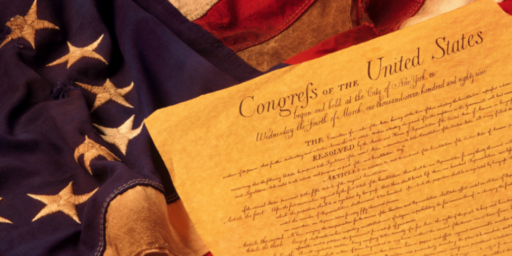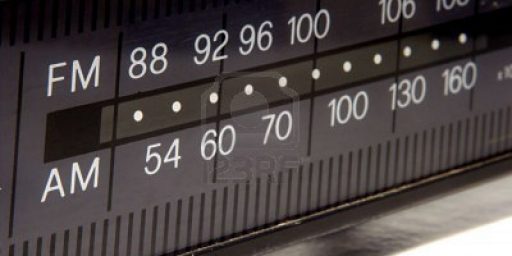Taking Public Funding Out of Public Broadcasting
George Will argues, persuasively, for ending taxpayer financing for the Corporation for Public Broadcasting, the entity behind PBS and NPR. The essence of the argument boils down to this:
Not too long ago the Public Broadcasting Service tried an amazingly obtuse and arrogant slogan: “If PBS doesn’t do it, who will?” What was the antecedent of the pronoun “it”? Presumably “culture” or “seriousness” or “relevance.” Or something. But in a television universe that includes the History Channel, Biography, A&E, Bravo, National Geographic, Disney, TNT, BBC America, Animal Planet, the Learning Channel, the Outdoor Channel, Noggin, Nickelodeon, and scads of other cultural and information channels, what is the antecedent?
Noting, too, that Big Bird and other popular characters could generate much more money from merchandising, Will closes by asking, “Would [public broadcasting] vanish without the 15 percent of its revenue it gets from government? Let’s find out.”
Agreed. I haven’t watched PBS in years but would hate to see NPR go away. But there’s no reason that it would. They could, presumably, extend their semi-annual pledge drives another day. Or, shudders, air a commercial every hour.
Michelle Malkin liked the essay as well but twists the knife a bit, adding, “Mr. Will, how about calling for an end to government subsidies of professional baseball stadiums too?” I agree in principle but, as I’ve argued elsewhere, the competition for sports teams isn’t a free market.






NPR has a marketable brand. I think they’ll do well on a satellite radio setup like XM or Sirius. Bob Edwards seems to be doing well on XM. I’ve been seriously contemplating the move to satellite as I’m sick and tired of the music on FM. I’m just waiting for the price of equipment to drop before making the plunge.
I had hoped that Al Gore would buy PBS when he was casting about for a media property to take it off the taxpayer’s hands once and for all.
Did you know that Al Gore invented the radio?
lets sell it to FOX News , than the facists will own all the media
Or sell it to CBS, and have a children’s workshop hosted by Bert and Ernie on how to create document knock-offs for the next generation of leftist liars. It sure would helped Dan Rather a few months ago…
NPR has a marketable brand.
That’s related to the argument that didn’t seem to catch fire when it was floated years ago: that PBS television properties are quite well marketed as toys and such — does anyone sane believe that if PBS were either privatized or simply ended, that Big Bird and Elmo, for example, would go away?
First of all, NPR has pretty much entirely removed itself from government funding. I believe this was done partially on purpose, as it has seen this pressure building for some time now.
The Corporation for Public Broadcasting (CPB) gets about $400 million in appropriations from Congress annually now, and about the same from state governments, which make up roughly 1/3 of it’s budget. That gets us :
CPB is not looking to the federal government for all of it’s budget :
CPB is both a producer of original programming, such as the Ken Burns documentaries, and a funder and early adopter of technological innovation, such as PAD (program associated data), digital radio, digital television, PRX, podcasting and others. They provide coverage that commercial stations lack because although it may be important, it is not commercially lucrative, such as full political convention coverage or congressional committee coverage. It produces quality teaching resources, such as Frontline, documentaries and teaching materials and references for my wife (who is a high school teacher), offering them for free on their websites.
They are leaders and provide funding to try out new technologies and formats and produce content that may not be commercially justified, but that businesses and commercial formats often take advantage of later. The seed money the federal government provides for the important work CPB does helps to generate matching funds from other sources. It’s not just 15% of the budget that will disappear – it is all the money that that initial money generates as well. Public media will be severely hurt, which in turn will hurt the level of public awareness, educational resources and commercial media that depend on CPB to develop programming, spur innovation and forge technological progress.
CPB sponsored media and programming are also helpful to our civic education. People who do watch PBS or listen to NPR are better informed about world and national events than people who do not. Neither is it just for hippies – listener demographics for NPR are about 1/3 liberal, 1/3 conservative and 1/3 independent.
The $400 million annual appropriation that our government provides CPB is one of the best returns on investment that we make, benefiting the people who see and hear the programming, those who the receive the grants, and the companies that follow in their footsteps and make money without having to foot the initial bills of research and experimentation. Cutting that money because you are depending on some stereotyped notion of CPB and it’s consumers being snooty or arrogant is both ignorant and incredibly short sighted.